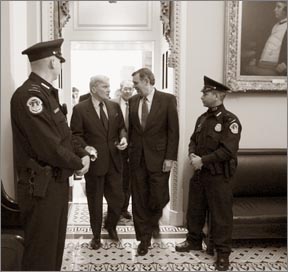|
observer |
|
|
|
|
|
OTHER LINKS |

|

|

|
Romney kicks off presidential campaign with fundraising blitz
Republican Mitt Romney said he wasn't trying to send a message, but his supporters did so - loud and clear - by raising $6.5 million in one day to launch his presidential exploratory committee. "They've come together and blown us away today, and humbled us at the same time," the beaming former Massachusetts governor said Monday as he clutched the hand of his wife, Ann. "Had we raised $80,000 today, that would have made me rethink." The figure dwarfed the $2 million estimated to have been raised by Sen. John McCain, R-Ariz., and the $1 million raised by former New York Mayor Rudy Giuliani, who also have created 2008 exploratory committees. While Romney declared he was not trying to send message to anybody but his supporters, one of his national fundraising co-chairman disagreed. "I think it's going to be a very strong message today - to everybody," said Tom Tellefsen, a former Harvard Business School classmate of Romney's and President Bush who was a fundraising "Pioneer" and "Super-Ranger" for past Bush campaigns. "I think it's going to be a strong message to McCain as well as Giuliani, and I think it's going to be a strong message to those that are considering or haven't really yet laid the groundwork that maybe they should have," added Tellefsen, a Romney national fundraising co-chairman. Among those also considering campaigns, arguing conservatives aren't adequately represented in the current field, are Sen. Sam Brownback, R-Kan., former Gov. Mike Huckabee of Arkansas and former Virginia Gov. Jim Gilmore. "This is not, if you will, a big flash and a disappearance," Romney declared. "What happened today underscores the validity of this effort." Although a multimillionaire, Rommney said that contributing any of his personal wealth to the campaign "would be akin to a nightmare" - even though he reserved the right to do so should circumstances warrant. He contributed $6.3 million to his 2002 gubernatorial race. Rather, the governor viewed the financial support as a signal of his political support. "We're going to have a real campaign," he said. "We've got to make sure that we've got ground teams in Iowa and ground teams in New Hampshire, South Carolina, and then we go on to other critical states. And you can't do that, as you have in the past, potentially with sort of a bootstraps campaign. The schedule has been so compressed ... that you've got to have the financial wherewithal to run a legitimate campaign or you're just going to detract from the people who have that potential." Spencer Zwick, Romney's national finance director, said the novel approach was aimed at avoiding cold calls and instead tapping networks through executive Rolodexes or personal Christmas card lists. "We do know in political fundraising, money talks but early money screams," he said. While Romney's committee is still labeled "exploratory," he and his staff have made it clear they are in the race to win. Romney had to catch himself as he introduced his brother, Scott, a Detroit lawyer whom he started to say was taking a year leave from his job. "Well, who knows how much time," Romney corrected himself. The first item on their agenda is securing the necessary funding for what the Federal Election Commission chairman recently said could be the first $1 billion presidential campaign. BBC |











